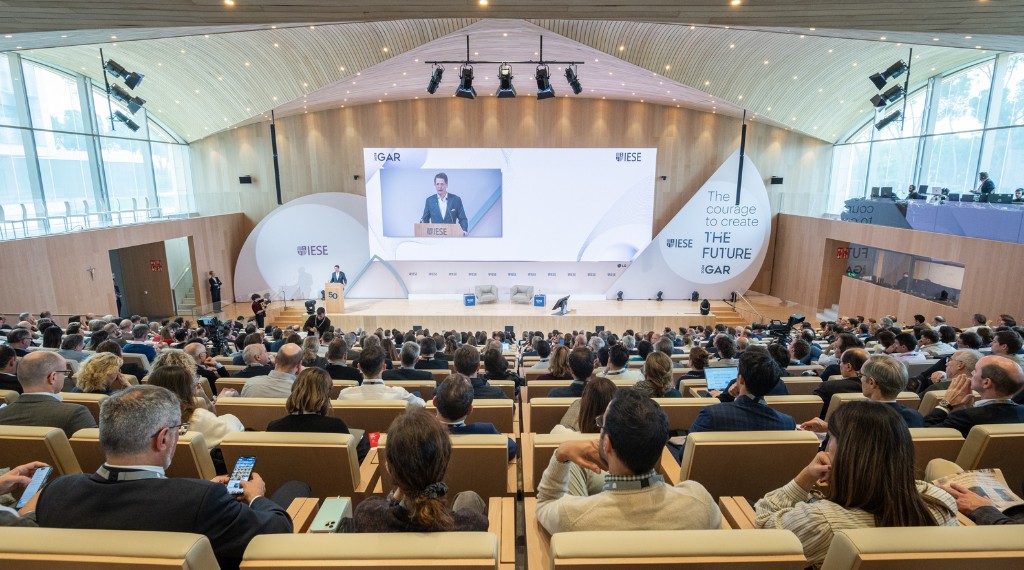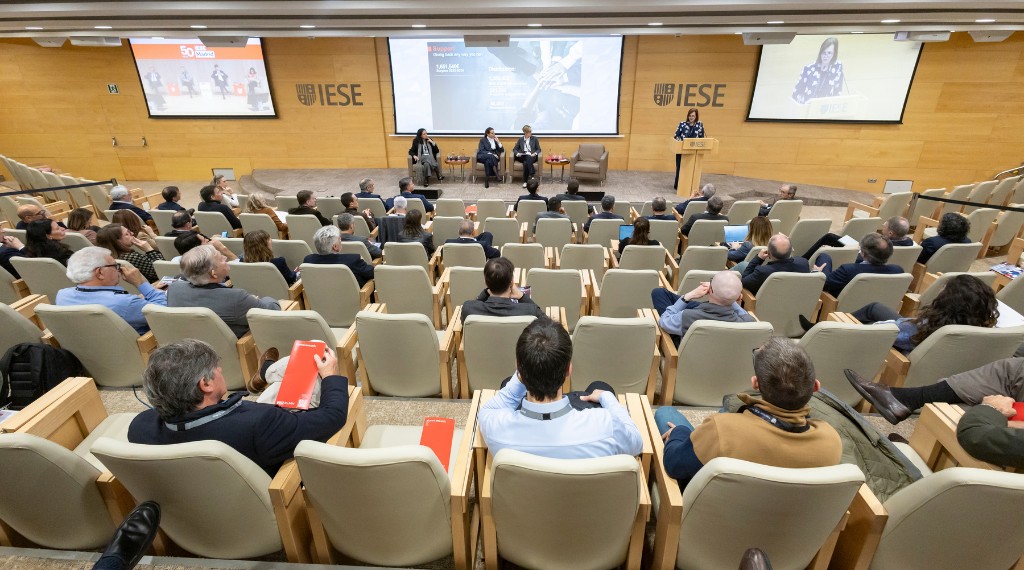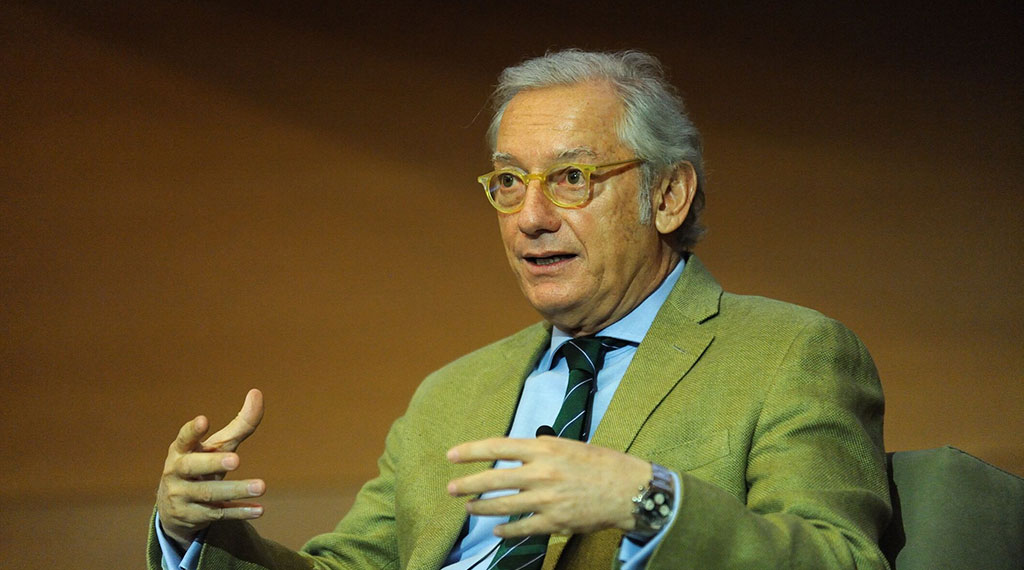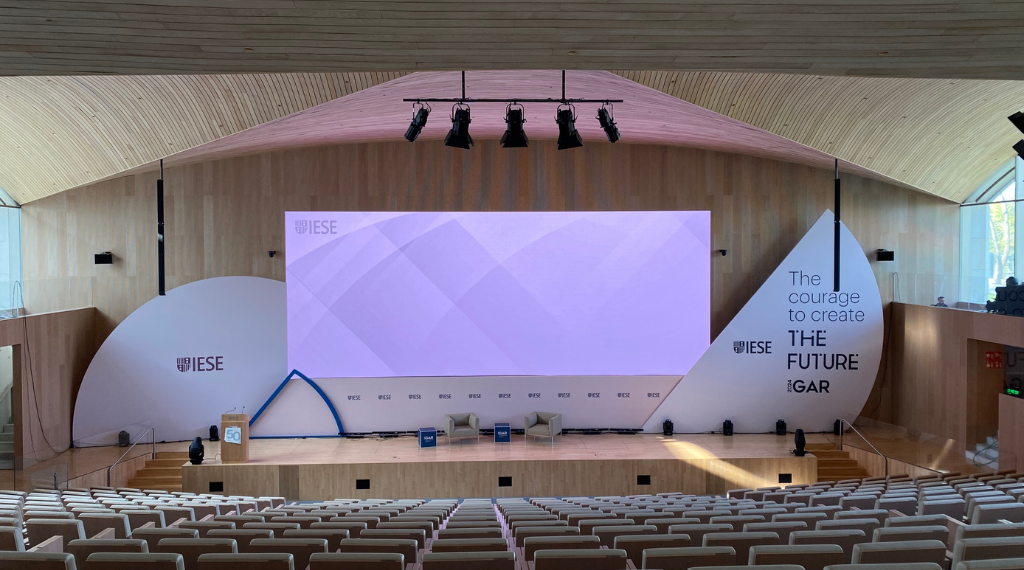Stories
Artificial intelligence and management are stars of Global Alumni Reunion 2024
The IESE alumni community explored how to embrace AI adoption across sectors with a human-centered approach
November 18, 2024

The Global Alumni Reunion (GAR) 2024 brought the IESE alumni community together to explore the need for business leaders to embrace artificial intelligence in their organizations and ensure that other employees do so as well.
Under the theme “The Courage to Create the Future,” the GAR program featured visits to innovative companies such as Microsoft, Mahou San Miguel, Celonis, Amazon and Real Madrid along with two days of talks by business leaders and professors on what AI means for people, organizations and society.
The event was held Nov. 14-16 on IESE’s expanding Madrid campus, which this year is celebrating 50 years of activity in the Spanish capital.
The timing of the event was fitting in another way: two years ago this month, OpenAI launched ChatGPT, the tool that brought generative AI to millions of users and drove home the transformative potential of the technology– as well as its risks to human activity.
GAR speakers repeatedly returned to the idea that AI will affect every individual and organization, demanding new ways of working and managing. And there’s no way now for the AI genie to be put back in its bottle.
“The pre-AI world is gone,” said Prof. Sampsa Samila, who served as co-academic director of the GAR, together with Prof. Marta Elvira. “AI will touch every single one of us.”
Putting humans at the heart of AI
More than the technology itself, the speakers reflected on the human response to AI. “The challenge with artificial intelligence is how you achieve that people embrace the change,” said Luis Gallego, CEO of airline holding IAG.
Noting that “artificial intelligence is everywhere,” Jonathan Lakin, founder and CEO of Intent HQ, said that one of the main brakes on AI adoption is “the capacity we have as humans and organizations to adapt to this change.”
But managing that transition is possible, especially if organizations can show their employees that while AI may take over some routine, repetitive jobs, it will also free them to do more complex and fulfilling tasks. Rather than diminishing human employees, it can empower them.
Paloma San Valentín, managing director of Moody’s said we will all have to learn to coexist with a “new species of agents.” “AI is not going to replace you, but people with AI are going to replace you.”
Gwenaelle Avice Huet of Schneider Electric explained how the energy company is deploying AI to make its activities more efficient, while it also monitors the development of more sustainable data centers, with their enormous demand for power and water.
That’s not always an easy task, especially at the organizational level. “It’s an element we should leverage in order to concentrate our people on higher value-added tasks,” Huet said.
“It’s about building a future where technology and humanity go hand in hand,” said Maria Díaz-Morera, president of the IESE Alumni Association.
Beyond organizations, AI could uniquely impact Africa, with its digital demand, surging population and lagging development. “Imagine the potential for technology to revolutionize and turbocharge these trends that already exist on the continent,” said Rita Babihuga-Nsanze, chief economist of the Africa Finance Corporation.
Management is the biggest complement to AI
This is where management comes in. The successful implementation of AI fundamentally depends much more on managerial expertise than technological competence, speakers noted.
Prof. Mireia Giné presented research showing that companies which are adopting AI are hiring more managers, in absolute terms and as a share of total employees. “AI adoption is not a technology project. It is mostly a management endeavor,” she said.
The research showed that for every one percentage point increase of AI adoption measured, there was an increase of 2.5% to 7.5% of total management vacancies and an increase of 0.4% to 1.4% in the share of managers. But those managers needed to have different skillsets than before. AI may increasingly handle budgeting and scheduling, for example, but firms will place a greater premium on skills such as problem solving, creativity and stakeholder management.
Prof. Eduard Talamás also presented research into knowledge workers, noting that much of what we do is prediction-based – precisely what AI excels at. That means we need to re-think our work, rather than adjust it, and craft new processes rather than tweaking existing ones with AI. “The key is to think big,” Talamás said.
That puts the onus on managers to use their human judgement to ensure AI is used responsibly. Ariadna Font Llitjós, CEO of Alinia AI, defined the responsible use of AI as one that uses ethics, transparency and alignment to put human values at the center. She recommends executives take the lead in ensuring AI aligns with company values and in establishing responsible AI principles like fairness and accountability.
Companies also need to foster a culture that leads to real change. Executives like Alexander Rinke, co-founder & CEO of Celonis and Luis Maroto, president and CEO of Amadeus noted that they have been incorporating AI into their workstreams for many years, as part of constant digital transformation. “We have been working with AI for 30 years,” Moroto said. “I’m a strong believer in constant evolution.”
Europe: overachieving in regulation, underachieving in technology
And where does Europe stand in the race to develop and deploy AI? Regulation as a deterrent to innovation was a common complaint.
Mateo Valero, director of the Barcelona Supercomputing Center, warned that Europe needs to develop its own technologies in order to wield real influence. “The politicians can say whatever they like,” Valero said. “But it’s a little late for Europe.”
Regulation sometimes makes it difficult for deep-tech ideas to move from the lab to production to the market, Ignacio Cirac, an expert in quantum computation from the Max Planck Institute of Quantum Optics, said.
And regulation isn’t the only obstacle. Enrique Lizaso, founder and CEO of Multiverse Computing, noted that deploying venture capital is another challenge in Europe. “Regulation is a problem, but financing is another one. We have money, but we don’t have an innovative financing infrastructure.”
For Eva Maydell, a member of the European Parliament, it’s a question of trying to “balance innovation and regulation to ensure that AI growth benefits us all, benefits the entire society.” That requires an ethical and transparent AI, a human-centric approach that sees the technology as a tool, which needs auditing and monitoring to help people rather than replace them.
That is what the EU AI Act attempted to achieve, she said. And while Europe has a reputation for regulating, it also has a reputation for protecting its citizens.
“There’s no way we can catch up overnight or over a year, but I think we need to find the niches where Europe can grow,” she said.


